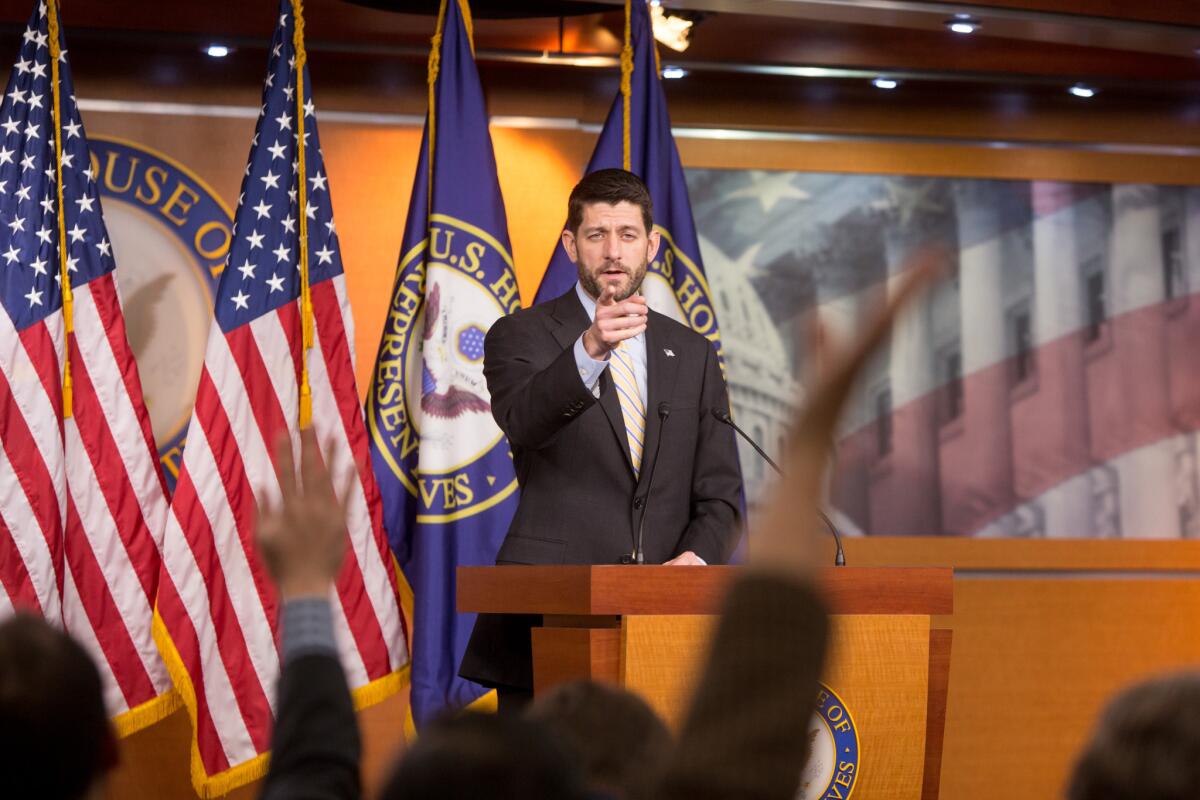Why go without a fight? Congress heads toward the last budget battle of the year

House Speaker Paul D. Ryan (R-Wis.) has declined to commit to a pushed-back deadline on the budget bill.
- Share via
Reporting from Washington — Congress is poised to pass a stopgap spending bill to avert a Friday shutdown and keep the government running five more days as a standoff intensifies over controversial add-ons included in the year-end budget deal.
As Democrats resist dozens of GOP-led efforts to rollback women’s reproductive health services, halt environmental regulations to fight climate change and undo financial services reforms approved after the Great Recession, they were backed by top White House officials in private meetings this week.
Democrats are instead pushing to include their own priorities, including lifting a ban on federal gun violence research.
The Senate approved the stopgap measure Thursday, and the House passed it Friday, when funding officially was to run out, buying a few more days for talks. The White House has signaled that it will sign the measure as long as it pushes the deadline back by only a few days to give lawmakers more time.
But House Speaker Paul D. Ryan (R-Wis.) declined to commit to meeting the new deadline of Wednesday to pass a bill.
“We don’t want to rush legislation, especially big legislation like this omnibus appropriations,” Ryan said at a Thursday news briefing. “We’re trading offers. We’re talking to each other. We’re doing all of the things that you would do, the appropriators and the leaders, so that we can get to an agreement.”
Congress reached a budget accord in the fall, which set government spending levels through the remainder of the fiscal year and gave lawmakers until Friday to develop the funding bill.
But approving the details of the $1.1-trillion spending plan have fallen into a familiar pattern of brinkmanship as both parties use the must-pass measure to tack on policy priorities.
Complicating efforts is a separate battle to extend — or possibly make permanent — dozens of specialty tax breaks that are routinely approved at the end of each year.
The tax breaks cover a long list of constituent-pleasing write-offs — for teachers to deduct classroom expenses or NASCAR owners to develop race tracks — and touch industries across the nation, including film production. New this year are tax breaks for citrus and nut growers, as well as changes in the tax treatment of real estate investment trusts.
But Congress is also considering doing away with two Obamacare taxes, including the 40% tax on high-end healthcare plans that Democrats want to undo and another on medical-device manufacturers that Republicans have led efforts to repeal.
Making those and the other tax breaks permanent would be a sweeping compromise, a nearly $700-billion undertaking that appears increasingly difficult as negotiations drag before the holiday recess.
Democrats believe time is on their side, because Ryan, like former Speaker John A. Boehner, cannot rely on his majority Republicans to pass the spending bill. Most Republicans opposed the fall budget accord, which required House Minority Leader Nancy Pelosi to rally Democrats for passage.
With Ryan again needing Democratic votes, Pelosi is able to drive a hard bargain as negotiations enter the final stage. The San Francisco Democrat and Senate Minority Leader Harry Reid (D-Nev.) see little reason to accept the GOP’s “poison pills,” and they are not only blocking Republican priorities but also pressing for their own goals.
“Let’s try to take this opportunity to say: ‘You want to pass a bill that has all of your priorities in it? Our priority is to remove the ban on research on gun violence,’” Pelosi said Thursday.
One area of common ground may be inclusion of a House-passed measure to restrict visa-free travel from European countries and some U.S. allies in Asia. The bill, brought in response to recent terrorist attacks in Paris and San Bernardino, was approved overwhelmingly in the House and has support in the Senate.
Talks also seem to be coalescing around a plan to end the decades-old ban against U.S. oil exports, a GOP priority that Democrats may accept if their other goals are also met.
Republicans, though, are also pushing to block Syrian refugees from entering the U.S., a bill that was approved by a wide margin in the House but has been panned by Senate Democrats and the White House.
Negotiations are expected to continue through the weekend, but a Democratic aide said Thursday they remained far apart with dozens of outstanding issues to be resolved.
“If Democratic votes are needed to carry this through the House, then there’s got to be something for Democrats to vote for,” the aide said.
For the latest from Congress and 2016 campaign follow @LisaMascaro.
For more, go to www.latimes.com/politics.
MORE IN POLITICS
In rare bipartisan vote, House passes visa-waiver bill to beef up travel restrictions
Democrats campaigning aggressively on gun control, dropping longtime reticence
Iowa tow truck driver shows why Trump backers stand by him after call for Muslim ban
More to Read
Get the L.A. Times Politics newsletter
Deeply reported insights into legislation, politics and policy from Sacramento, Washington and beyond. In your inbox three times per week.
You may occasionally receive promotional content from the Los Angeles Times.











